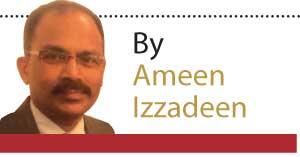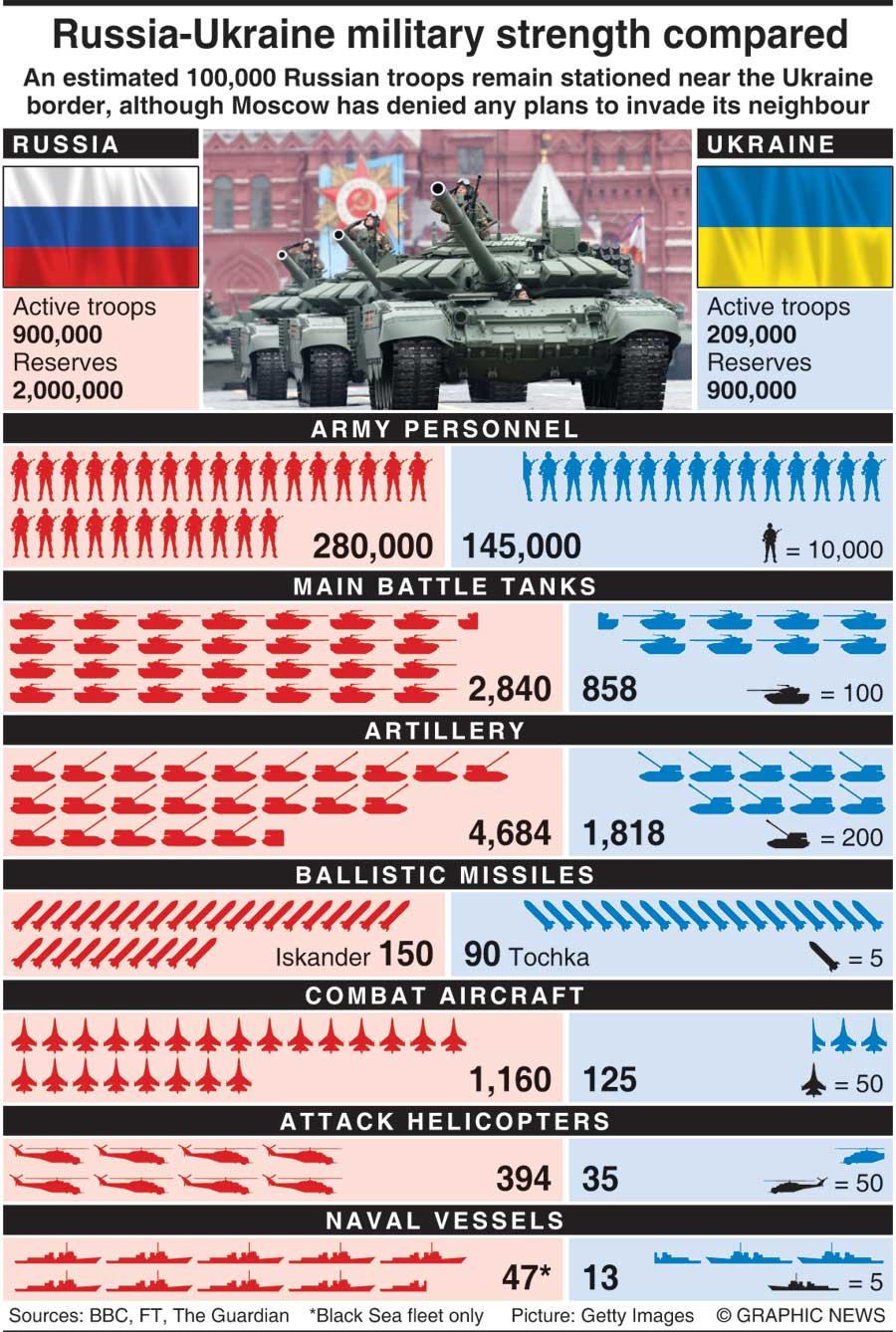28 Jan 2022 - {{hitsCtrl.values.hits}}
Is the Third World War coming soon with the United States together with its Western allies deciding to take on Russia over the Ukrainian crisis? It is said nuclear powers do not go to war due to what is called nuclear deterrence or the common-sense rule that there is only mutually assured destruction (MAD) if they use nuclear weapons in a war.
due to what is called nuclear deterrence or the common-sense rule that there is only mutually assured destruction (MAD) if they use nuclear weapons in a war.
Nuclear deterrence had worked throughout the four decades of the Cold War that ended in 1991. Even the Cuban missile crisis was defused without the then two superpowers – the United States and the Soviet Union – resorting to a nuclear war, although the crisis almost triggered one.
But for nuclear deterrence to work, there is a vital condition: Leaders of nuclear-powered nations should be humanely rational. If a psychopath leads a nuclear powered nation, we cannot be complacent about the world security hoping that nuclear deterrence will work. The closest we were to such danger was when the US administration was headed by Donald Trump, a man about whom 27 top US psychiatrists, psychologists, and mental health professionals warned that he posed a danger to the nation and American citizens. Trump did not start a new war during his four-year presidency, but his eccentric behaviour raised fears that he could order a nuclear attack on a nation he did not like. The only solace we had during the Trump era was our belief that those who staffed the US nuclear command and control (NC2) system would not obey Trump’s irrational command for a nuclear attack.
However, it was unfortunate that the present US president Joe Biden is dragging the nation to the brink of a nuclear war, though part of the blame should also be on Russia’s strongman Vladimir Putin for escalating the tension by threatening to invade Ukraine and install a puppet regime in Kyiv. In International politics, big powers adopt various methods – from wars and revolutions to bribes and debt traps -- to ensure that nations they regard as strategically important are run by leaders who would comply with their commands. In recent decades, by military means, the US ensured that Afghanistan, Iraq and Libya were run by governments headed by acolytes. In Egypt, Ecuador and a host of other countries, the US manipulated the democratic process or instigated revolutions named under various colours of the rainbow to bring about a regime change. Russia also has done this in Central Asia and its immediate eastern neighbourhood to ensure that these countries do not become a strategic headache.
In international politics, a big power regards a rival power’s intervention in the affairs of a nation in its backyard as a hostile act or a security threat. This is the core of the crisis involving Ukraine, which is Russia’s immediate eastern neighbour. During the Cold War, Europe remained divided with the Western European nations aligning themselves with the US, while Eastern European countries adopted communism and came under the security umbrella of the Soviet Union. When the Cold War ended, Eastern European nations abandoned communism and embraced democracy together with free-market economic principles. One by one, former communist nations became members of the US-led North Atlantic Treaty Organisation and the European Union, starting with the Baltic nations of Estonia, Latvia, and Lithuania. Following suit were Poland, Hungary, the Czech Republic, Romania, Bulgaria and others.
In the wake of the end of the Cold War, Russia, which inherited the Soviet Union’s international obligations, was plunged into an economic crisis. For several years it was busy resurrecting the economy while also fighting costly wars to suppress secessionist movements in oil rich regions of Chechnya and Dagestan. There were some early talks aimed at bringing Russia also into the fold of the Western alliance, but such talks collapsed due to fears that Russia’s dominant role might not go well with the alliance’s global agenda.
With East European nations gradually joining the NATO and the EU, the line that divided Europe during the Cold War era kept moving towards Russia. By 2006, the West wanted to take the line all the way to Russia’s border. This triggered the 2008 Georgia war with Russia militarily intervening and helping South Ossetia and Abkhazia to secede from Georgia.
Riled over the failure to absorb Georgia into the alliance, the West decided to implement its Plan B in Ukraine. Instead of direct membership, Ukraine was coerced to sign a partnership agreement with the EU. The then Ukrainian President Viktor Yanuchovych, who was elected in a democratic election, negotiated the deal, but under Russia’s influence withdrew from it at the last minute in 2014.
The about-turn infuriated the West, especially the US. The events that followed saw a massive protest in Kyiv’s Maidan square by Ukrainians who thought the agreement with the EU would help end the country’s economic misery. The Western media described the protest as a revolution – the Revolution of Dignity. To defuse the crisis, President Yanuchovych offered a compromise: He agreed to make the opposition leader the Prime Minister. The Europeans gave tacit approval to the power-sharing formula, but the US wanted Yanuchovych ousted.
In a leaked recording of her conversation with the US ambassador in Ukraine, an angry US Assistant Secretary of State for European Affairs, Victoria Nuland, was heard using the F word to express her frustration at the Europeans. The revolution forced Yanuchovych to seek political asylum in Russia. A pro-West government was set up in Kyiv, but not before an angry Russia annexing Ukraine’s pro-Russian region of Crimea and increasing its moral and military support for the pro-Russian separatist movement in Ukraine’s Donbas region bordering Russia. More than 13,000 people have been killed in the simmering conflict in Donbas despite a 2014 ceasefire agreement.
However, since then, Russia has been waiting for an opportunity to send a powerful message to the West: Do not mess around in Russia’s neighbourhood, especially Ukraine – which Russia regards as the red line the West should not cross. In the Covid pandemic, especially at a time when the West was grappling with the Omicron variant, Russia saw an opportunity to increase the pressure on the West by amassing more than 100,000 Russian troops on Ukraine’s border.
High-level US-Russia talks failed to resolve the crisis, with Russia insisting that NATO should agree to stop its eastward expansion. The West’s position is that Ukraine is a sovereign nation and, therefore, it should decide what it thinks is right for it. To checkmate Russia, the US is strengthening the European security capability to face any eventuality, while it is also threatening Russia with tough sanctions.
Both Russia and the US, instead of upping the ante by hostile moves, should try to find the middle ground. Probably Findlandization could be a way out, with Ukraine adopting a ‘non-aligned’ policy. Even a limited war will shoot up the oil prices and spell disaster to the rest of the world, especially poor countries struggling to cope with the economic blows from the pandemic.

28 Nov 2024 48 minute ago
28 Nov 2024 2 hours ago
28 Nov 2024 2 hours ago
28 Nov 2024 3 hours ago
28 Nov 2024 4 hours ago